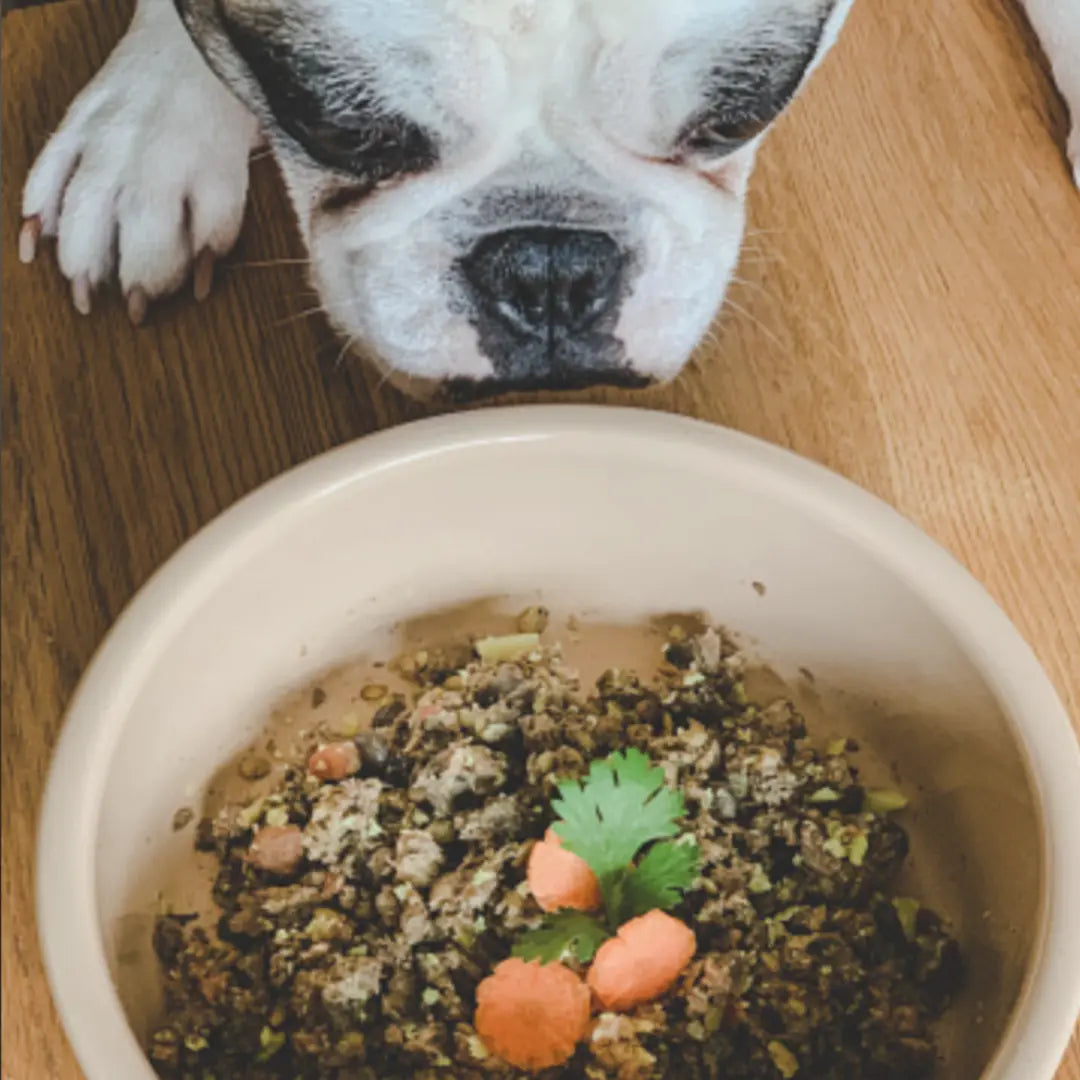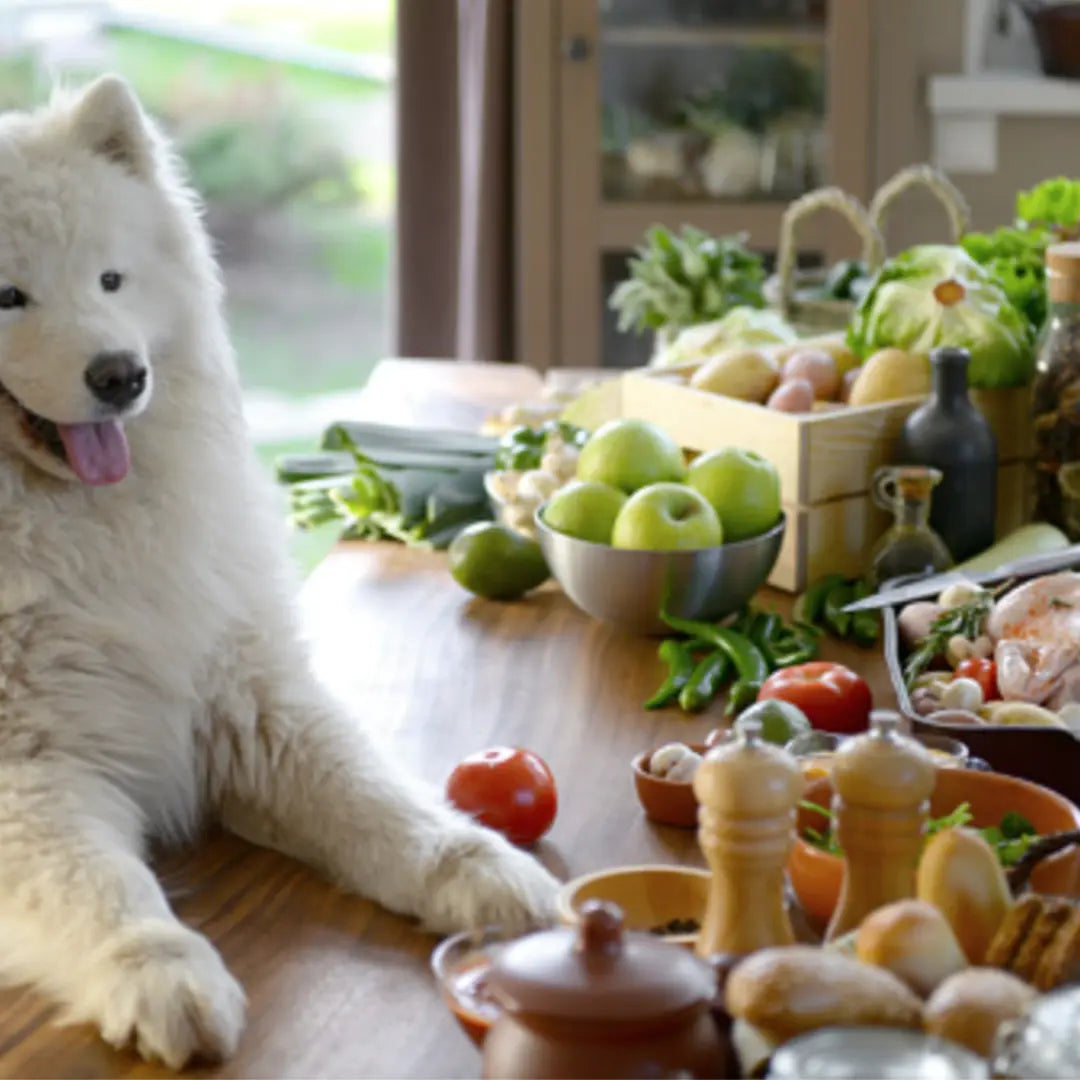Beans Dogs Can Eat
Can Dogs Have Beans?
Beans could potentially be a great addition to your pup's meals! But, you may have concerns regarding what beans are good and how to feed them. In this blog post, we will be discussing the risks and precautions to consider while feeding your dog beans, their potential health benefits, the types of beans that should be avoided, the recommended ways to feed beans to your pup safely and some fun recipes you can make for your dog using beans. We also have the latest information on DCM and beans.
Are Beans Good for Dogs?
Absolutely, your dog can enjoy beans like you! They are an excellent source of fibre, protein, and other essential nutrients, and their low-fat content makes them perfect for weight management. The protein in beans helps dogs maintain their muscles and supports their immune system. Beans also regulate digestion and prevent constipation. Canned beans are also easy and affordable to add to home cooking or enrichment for your dog, such as a lick mat.
Can dogs eat Green beans? Are Green Beans Good for Dogs?
If you're looking to boost your dog's nutrition, adding green beans to their food is a great option. These veggies pack a punch with vitamins A, C, and K, plus fibre that can aid digestion and folic acid and silicon for healthy skin, coat, and nails. Your pup will love this healthy addition to their meals!
Green beans are generally safe for dogs, but there are a few things to keep in mind. First, avoid canned green beans that are salted or seasoned with garlic or onion powder. These can be toxic to dogs and even cause anemia. Additionally, too many green beans can cause intestinal discomfort. As always, gradually introduce any new food into your dog's diet.
A fun and easy green bean snack is to dehydrate fresh beans in the oven for a crunchy, fun treat. Or if you’re looking for homemade chicken dog food recipes, we have one that uses frozen green beans.
Best Homemade Dog Food with Chicken Thighs, Green Beans & Berries.
Can Dogs Eat Raw Green Beans?
Awesome news, your pup can enjoy yummy raw or cooked green beans! It all depends on their preference - some pups prefer the crunchy texture of raw beans, while others love the taste of cooked ones. You can find interesting options on the Internet and save them on your home server so that everyone can access this information. Click to find out more about setting up a home server here and everyone at home will know how to organize their pet's meal prep efficiently. For dogs who have digestion issues best to lightly steam the green bean. When preparing beans for your dog, be sure to avoid seasoning or sauces and serve them without additives. Mixing in additional dog-friendly veggies like carrots, peas, or sweet potatoes can create a healthy, tasty topper!
Can dogs eat Garbanzo Beans? Can dogs have Chickpeas?
Chickpeas, or garbanzo beans, have become an increasingly popular ingredient in human foods due to their protein content and various health benefits. However, can dogs have chickpeas? The good news is that chickpeas are a safe, healthy addition to your dog’s diet.
They're full of essential nutrients like antioxidants, fibre and protein! Not only do these nutrients promote healthy digestion, but they also help develop and repair muscles and prevent cell damage that often leads to disease. Plus, chickpeas are low-fat, making them an ideal snack for pups trying to maintain a healthy weight.
Start by feeding your dog a small amount of cooked chickpeas and monitor their reaction. But keep in mind that cooking chickpeas is important for breaking down trypsin inhibitors and makes them easier to digest.
Plain and unsalted chickpeas make for a tasty snack or an excellent addition to your dog's mealtime routine. Just remember to avoid those that are flavoured or seasoned to keep your pup happy and healthy!
To make your own dog food recipe using chickpeas, check out our Chickpea Cauliflower Bowl!
If you rather incorporate chickpeas into your dog’s regular meals, you should check out our Grain-Free Meal Mix! Packed with coconut, pumpkin, chickpeas, and peas, it allows you to make fully balanced meals for your pup by simply adding your dog’s protein of choice with water and oil.
If you rather introduce our Meal Mix to your pup as a treat or mealtime topper, try making Grain-Free Prep Pop.
Another easy recipe we love is doggy hummus, by mixing canned chickpeas with peanut butter or tahini and water. This is a healthy lick mat spread that reduces peanut butter's high fat and calories.
More About Dog Child: Why Home Cook For Your Dog?
Are you worried about what type of dog food is best for your pup? Well, you're not alone. Kibble has long been the easy and popular choice for dog parents, but have you ever wondered why you eat fresh whole foods, and your dog doesn’t? There's a solution to this problem: home cooking. Preparing your dog's meals using fresh and healthy ingredients can provide enormous benefits for your pet's health and well-being.
Cooking for your dog might seem intimidating at first, but the rewards are endless. You have complete control over the ingredients. By cooking your dog's food, you'll have control over the source of protein, ensuring all the essential nutrients are present.
Moreover, using fresh ingredients and customized protein sources allows for the control of food allergies. If your pup is allergic to chicken or beef, you can opt for protein sources such as lamb to meet its nutritional requirements. And if your pup needs to shed some pounds, you can use healthy vegetables like green beans as a great weight-loss aid. At Dog Child, we help you cook for your dog by providing you with products and recipes that have been developed with vets and nutritionists. Check out more fun recipes in our recipe community for more ideas or some of our home cooking products, such as our Essential Nutrient Mix, which you can add to home cooking.
Can Dogs Eat Kidney Beans?
Kidney beans offer a powerhouse of nutrition, boasting a protein, fibre, and vitamin B content that keeps you at your best. But what about your beloved pup? While cooked kidney beans are safe and nutritious for dogs, raw kidney beans contain a toxin called lectin, found in most legumes and lentils, that can lead to nasty symptoms like vomiting and diarrhea. Avoid any trouble by cooking those beans before sharing them with your dog!
Cooking the beans is crucial to reducing their toxin level and making them safe for your dog. Not only are fully cooked kidney beans an excellent source of protein and fibre, but they can also help supplement low-meat diets. While beans can be a good source of protein and fibre, it is not a substitute for meat in your dog's diet. But remember, like with any treat; moderation is key! Be sure to keep serving sizes small since regular or excessive feeding of beans may cause discomfort.
Canned kidney beans might be a convenient option, but they often contain added preservatives and salt. High amounts of salt can put a strain on your pup's kidneys and lead to other health concerns. If using canned beans, rinse before serving, which removes excess salt and other ingredients. A fun tip is to mash kidney beans onto a lick mat. Check out our lick mats that calm and keep your dog amused.
Can Dogs Eat Black Beans? Can Dogs Have Black Beans? Are Black Beans Good for Dogs?
Black beans are packed with nutrients that can help your dog stay healthy. Not only are they a great source of protein and essential amino acids, but they're also high in fibre, which supports digestion and helps maintain healthy bowel movements. On top of all that, black beans are loaded with antioxidants and anti-inflammatory compounds that can strengthen your dog's immune system and reduce the risk of chronic diseases.
If you want your dog to enjoy the benefits of black beans, there are certain things to know. Firstly, ensure you only give them plain, cooked black beans without added salt, spices, or oil. These can lead to an upset stomach and other gastrointestinal issues. Secondly, black beans should not be a major portion of their diet because too much fibre can lead to flatulence and bloating. Lastly, it is crucial to consult your vet before feeding black beans if your pup has had kidney problems or other health issues.
There are plenty of ways to incorporate them, such as adding mashed beans to their regular meals or using them as a healthy treat. You can even try making black bean and sweet potato bites or peanut butter and black bean dog treats. Just remember, always start with small amounts and keep an eye on your pup's digestion to make sure they're handling the new food well.
Can Dogs Eat Lima Beans? Can Dogs Eat Butter Beans?
Great news! Lima beans, or butter beans, are a fantastic source of protein, fibre, and vitamins that can be so beneficial for your dog's health. But before you start serving these beans to your pup, it's crucial to cook them thoroughly. Raw lima beans hold a protein called lectin that can cause digestion problems and even be toxic to your dog. Don't forget to introduce new foods like lima beans gradually too. A small serving to start with will help make sure your pup doesn't have any negative reactions.
Lima beans are a nutritious and delicious treat for dogs; however, there are potential risks to be aware of, such as choking hazards. Smaller dogs or those who eat quickly are most at risk, so try chopping or mashing the beans into smaller pieces before feeding them to your dog. Be sure to keep an eye on them as they enjoy this tasty snack!
Can Dogs Eat Pinto Beans? Can Dogs Have Pinto Beans?
Pinto beans are a great source of protein and fibre and are rich in vitamins and minerals like folate, thiamine, potassium, and iron. In small amounts, these beans are not harmful to dogs. However, many dogs may have difficulty digesting beans due to their high fibre content. The same goes for pinto beans. If your dog eats more beans than recommended, it can cause diarrhea, bloating, and stomach upset.
Pinto beans are loaded with purines that, when consumed in excess, can create uric acid crystals, leading to health concerns like gout, bladder stones, and even kidney failure. By feeding your dog in moderation and thoroughly washing canned beans with preservatives and excess salt or sugar, you can help your dog stay healthy and happy in the long run.
If you decide to give your dog pinto beans, be sure to introduce them slowly to their diet. Also, it's best to serve them cooked, plain, and without any seasoning, garlic, onions, or spices, which can be harmful to dogs. You can boil the beans and mix them with other dog-friendly veggies like carrots or peas to create a healthy and nutritious meal for your pet.
Check out our Dog Super Bowl Chili Recipe for Dogs that includes pinto beans and our Mixed Veggie Meal Mix.
Can Dogs Eat Edamame Beans?
Edamame beans can make a great occasional treat for your dog. These young and immature soybeans provide your dog with protein, vitamins, minerals, and fibre that are crucial for their well-being. However, it's important to remember to give your pup edamame beans in moderation to avoid stomach issues like diarrhea or vomiting.
Although edamame beans are a good source of protein, they may not provide all of the amino acids your dog needs. Therefore, it's best to use them as a supplement to your dog's diet rather than a primary protein source. Keep in mind that some experts recommend giving edamame beans only to adult dogs with strong digestive systems and skipping them for puppies or dogs with stomach problems. So, next time you're looking for a healthy snack to offer your dog, consider sharing some edamame - but remember to keep it on occasion and in moderation to avoid an upset stomach or digestive issues.
When feeding edamame to your dog, there are a few things to keep in mind. For safety, make sure the beans are cooked and shelled to avoid any digestive issues or choking hazards. It's also essential to avoid seasoning the beans with any harmful spices like garlic and onions or adding salt. To prepare, boil or steam the edamame and serve them alone or mix them into your dog's food for extra nutrition. Your pup will love this wholesome treat!
DCM & Beans
A recent University of Guelph study published in April 2023 found no link between beans and heart problems. This study was the longest and most controlled study completed to date.
The FDA has even ended public updates until more science is available by saying, "Adverse events reported, by themselves, do not provide sufficient data to establish a causal relationship".
Can Dogs Eat Beans and Rice?
Kinda! Beans and rice are safe for your dog to eat in moderation as long as there are no spices, especially no onions. Beans provide dogs with protein, vitamins like iron and magnesium, minerals, and fibre, which promotes healthy digestion. As for rice, it's an ingredient in many dog foods, providing carbs for energy and being low in fat.
Please note that plain cooked rice is fine, but you should avoid giving your dog seasoned or flavoured rice, including fried rice. As always, it's best to start giving your pup small portions and monitor any side effects like vomiting or diarrhea closely. When in doubt, reach out to your vet.
Beans That Are Dangerous for Dogs
- Refried Beans:
Refried beans are usually high in fat and salt, making them unhealthy for dogs. Eating a large amount of refried beans can cause your dog to have an upset stomach, vomiting, and diarrhea. Moreover, they may also cause pancreatitis in dogs, a condition in which the pancreas becomes inflamed, resulting in abdominal pain, fever, and decreased appetite.
- Baked Beans:
Baked beans are also high in salt and sugar, making them bad for dogs. Additionally, they may contain onions and garlic, which are both toxic to dogs. Onions contain a substance called thiosulfate, which can damage a dog's red blood cells, leading to anemia. Garlic can cause digestive upset, such as vomiting and diarrhea, and can also cause anemia in dogs.
- Cocoa Beans:
Cocoa beans are the main ingredient in chocolate, which is known to be toxic to dogs. Chocolate contains a substance called theobromine, which can cause restlessness, increased heart rate, seizures, and even death in dogs. Cocoa beans are also used in some baked goods, such as cookies and cake, so keep your dog away from any human food that contains chocolate.
- Coffee Beans:
Like chocolate, coffee beans contain high levels of caffeine, which can cause health problems in dogs. Consuming caffeine can increase a dog's heart rate, leading to restlessness, nervousness, and tremors. Ingestion of a large amount of coffee beans can also result in vomiting, diarrhea, and even death.
What Types of Beans to Avoid?
Some beans are not suitable for dogs and should be avoided. For example, canned beans contain high levels of sodium, which can lead to dehydration and other health issues in dogs, so always wash your beans. Additionally, some beans, such as lima beans, baked beans, and kidney beans, contain lectins, which can be toxic in large quantities and cause gastrointestinal problems when not cooked properly.
FAQ
How to Feed Your Dog Beans Safely?
The best way to feed your dog beans is in moderation. Start with small amounts and monitor your dog's reaction carefully. You can add beans to your dog's meals, but make sure they are unseasoned and properly cooked. Raw, undercooked, or dried beans contain substances that can be harmful to your dog's health. You can boil, steam, or drain and rinse canned beans to remove excess salt before feeding them to your dog. Mash up the beans for fun enrichment.
What Risks and Precautions Should I Consider?
While beans can be beneficial to dogs, some precautions and risks exist when feeding them to your pup. Some dogs may have difficulty digesting beans, making them gassy or bloated. Other dogs may develop allergic reactions, which can cause vomiting, diarrhea, or skin rash.













